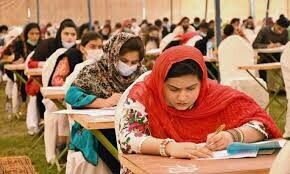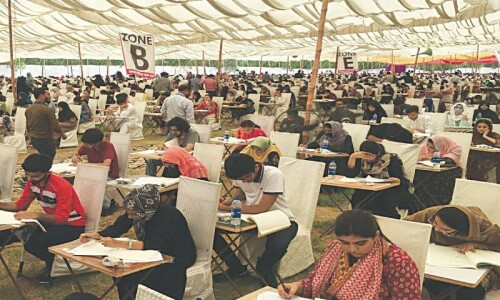• Court issues detailed judgement on petitions filed against paper leak
• Observes malpractice had put integrity of medical profession at stake
• Suggests advanced technological solutions to strengthen exam security
KARACHI: The Sindh High Court on Friday observed that financial incentive was one of the reasons for the paper leak of the Medical and Dental Colleges Admission Test (MDCAT) because many individuals were willing to pay significant sums to obtain an unfair advantage.
The SHC also noted that such demand had created a black market for exam materials with some individuals within or around the examination administration system tempted to leak questions in exchange for money.
“In an environment where academic integrity is undervalued, such actions can thrive. Moreover, there is often this lack of accountability mechanisms for those caught participating in or facilitating such premature release. Without strict penalties, there is little deterrence for individuals who might otherwise be tempted to compromise the exam’s integrity,” it added.
A two-judge bench comprising Justice Salahuddin Panhwar and Justice Amjad Ali Sahito made these observations in the detailed judgement issued on Friday in a set of identical petitions filed against paper leakage.
On Oct 26, the bench through a short order had ordered the authorities concerned to retake MDCAT within four weeks after a probe committee had unanimously concluded that the entire test procedure, conducted on Sept 22 in the province, had been compromised.
The judgement also said that several key factors contributed to the paper leak and significant cause was the presence of a weak regulatory framework within educational institutions and examination boards.
In some cases, there is inadequate coordination between the Pakistan Medical and Dental Council (PMDC) and the universities conducting such exam, it added.
The SHC further observed that the proceedings have helped the court to arrive at such a conclusion and there was absolutely no doubt that the integrity of medical profession itself was at stake as if individuals entered medical colleges without earning their place, the overall quality of future healthcare professionals may decline and that could have far-reaching effects on public health.
“Another reason for paper leakage is the financial incentive. The high stakes associated with MDCAT mean that many individuals are willing to pay significant sums to obtain an unfair advantage. This demand creates a black market for exam materials, with some individuals within or around the examination administration system tempted to leak questions in exchange for money,” it added.
The bench said that strengthening examination security was essential which could involve implementing advanced technological solutions such as secure online testing environments with proctoring or using multiple versions of test to make it difficult to share leaked questions widely.
It also stated that the institutions should adopt a zero-tolerance policy for anyone caught in paper leakage schemes ensuring strict consequences for such behaviour.
It further noted that “recent controversy surrounding the MDCAT 2024 has cast doubt on the entire examination process and credible reports have emerged of paper leaks and administrative misconduct which have severely undermined the integrity and credibility of this highly competitive examination”.
About an argument of judicial intervention in administrative matters of educational institutions, the SHC said that the courts respect the independence of educational institutions, but when they failed to establish robust systems and adequate checks to secure transparent processes, it becomes imperative for the judicial system to intervene.
“The courts have a critical role to play in ensuring justice for the students and candidates whose academic and professional futures have been unfairly compromised by the lapses and irregularities in the MDCAT 2024 examination”, it added.
The bench also observed that when such high-profile scandal remained unaddressed, it can significantly erode public trust in educational institutions and the credibility of medical profession as a whole.
Published in Dawn, November 16th, 2024















































